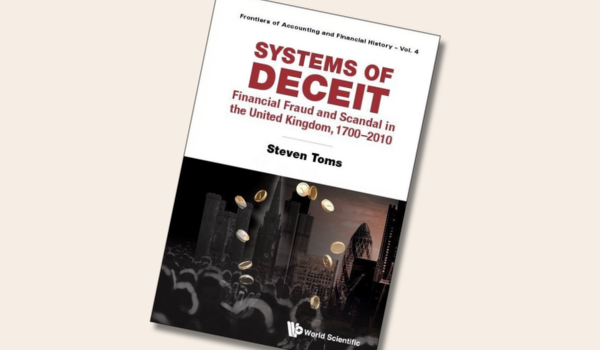Research project
Financial fraud and scandal: Lessons from history
- Start date: 1 January 2020
- End date: 31 December 2030
- Principal investigator: Professor Steve Toms

Description
Financial fraud and scandal present persistent and increasing challenges in the United Kingdom, posing significant threats to economic stability and public trust. Perpetrators exploit loopholes in accounting regulations and vulnerabilities within financial systems, costing billions annually.
From sophisticated Ponzi schemes to insider trading, the spectrum of fraudulent activities is vast, encompassing individuals, senior management, entrepreneurs and corporations. Government entities remain open to bribery and corruption.
Financial scandals not only erode investor confidence but also undermine the integrity of the financial sector, tarnishing the UK's reputation as a global financial hub. The character of fraud and scandal has reflected the changing character of the British economy.
Regulators often seem one step behind evolving tactics employed by fraudsters, leading to gaps in detection and prosecution. Complex financial products and transactions hidden in labyrinthine corporate structures, facilitated by the tax-haven secrecy jurisdictions that sprang from the ashes of the British Empire and the inter-connectedness of global financial markets amplify the extent and impact of fraudulent activities.
Research overview
The research examines the determinants of the extent of financial fraud and scandal. Taking a long-run historical approach, it examines the systematic structural and institutional causes of financial crime. It utilises databases of financial scandals.
One aspect of the project focuses on the twentieth century, up to and including the financial crisis of 2007-2008 and examines the macroeconomic determinants of financial fraud and scandal, including accounting scandals.
Another examines the corporate characteristics of businesses predisposed to fraud using the example of the Covid loan scheme.
As the project develops, the databases of financial fraud and scandal will be expanded to facilitate further comparative analysis and enhance the statistical robustness of the analysis.
Key findings
The project quantifies financial crime in the UK using three centuries of data. It demonstrates how financial fraud and scandal vary according to systematic economic and institutional arrangements. In doing so, it retells the history of British capitalism, from the mercantilism of the eighteenth century to the financial capitalism of the twenty-first century, illustrating the often negative consequences of economic ideology, policy and structure. It identifies periods when fraud has been less problematic and contrasts these with times when it has surged.
Twentieth and early twenty-first century evidence shows that economic freedom, including the degree of financial development, the availability of credit, the relative importance of the financial sector, international capital mobility and secrecy, and banking stability, contribute to the prevalence of fraud and scandal. Financial repression explains a generalised reduction in a 25-year period after the Second World War. Conversely, economic liberalisation from 1979 onwards has increased the incidence of fraud and financial scandal.
The variation of outcomes reflects the balance of power between the state, industrial and financial sectors, the provision of credit through risky lending, and the effectiveness of audits. "Rogue traders" and other flawed individuals are frequently the focus of blame narratives constructed with the intention of deflecting comprehensive systematic reforms.
Publications and outputs
- Toms, S. (2024). Systems Of Deceit: Financial Fraud and Scandal in the United Kingdom, 1700–2010, London: World Scientific.
- Toms, S. (2024). Six ways to reduce financial fraud – lessons from history, Research and Innovation Blog.
- Toms, S. (2024) Is there an economic institutionalisation of fraud? KPMG Beyond.
- Toms, S., & Lin, C. (2023). Economic freedom, financial development and the determinants of fraud and scandal: The United Kingdom, 1900–2010. Business History, 1-28.
- Toms, S. (2023) The characteristics of the fraudster. KPMG Beyond.
- Toms, S. (2019). Financial scandals: a historical overview. Accounting and Business Research, 49(5), 477-499.
- Toms, S. (2019). Are financial scandals the new normal? Research and Innovation Blog.
- Toms, S. (2018) The Institute of Chartered Accountants in England and Wales, IFBM conference 2018: Financial scandals. Watch the video presentation.
Contact: Professor Steve Toms

